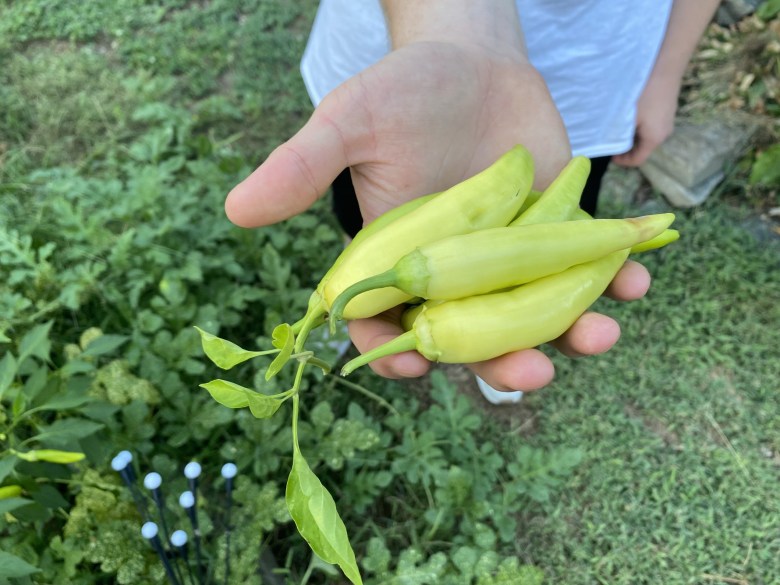Founded in 1946,
Isbell Farms
in Lonoke County has impressed many onlookers over the years with a commitment to sustainable rice farming, using water-saving tactics in the rice fields and generating much of its electricity through solar energy to reduce carbon emissions.
More recently, the family behind the multigenerational business also managed to corner the sake market, supplying breweries in both Arkansas and places as far-flung as Mexico and Canada with the rice needed to make the Japanese wine. But all the success with milling and selling sake-quality rice to operations like Origami Sake in Hot Springs left Isbell Farms with an economically dubious surplus of broken rice and rice flour.
Turning harvests into a sake-quality product requires a special mill to break the rice down into polished little white pieces. The process leaves behind disfigured kernels called brokens, along with a powdery substance known as rice flour. Though both of these scraps are perfectly good and edible rice products, Isbell Farms’ traditional customers weren’t interested in buying them.
Sixth-generation rice farmer
Harrison Jones
— the son of Jeremy and Whitney Jones, the daughter of the boss of the farm, Chris Isbell — told the
Arkansas Times
the two rice byproducts were piling up so fast, his family didn’t know what to do with it all.
“Some of the brokens go to dog food or cattle feed, but we still weren’t able to get rid of all of it,” Jones said. “It is still a really good, high-quality product, but it’s not what sake brewers want and it can’t be used for table rice because it’s broken down and totally different.”
Luckily for Jones, an hour drive away from the farm in the Pettaway neighborhood of downtown Little Rock,
Josiah Moody
was looking for somebody — really anybody — to sell him rice for his new craft beer brewery,
Moody Brews
, which opened in 2024. Moody reached out to mill after mill, and farmer after farmer, but his startup was so small that he couldn’t take in the volume of rice those operations were interested in selling.
Moody needed a few bags of rice per month, not a few traincarts full like the big rice farms are used to selling. Plus, he loved the idea of using locally grown rice from the largest rice-producing state in the country for his Arkansas-brewed rice lager. He’d been sourcing from Sam’s Club under the assumption that it might come from Arkansas, but wanted to start a truly local partnership.
So when he got the call from Jones about buying some broken rice, he jumped at the opportunity.
“There was this stigma on using rice for craft beer because for a very long time the Brewers Association messaging was, ‘We don’t use these adjuncts,’” Moody said. “‘Ours is all barley’ is what they said. That messaging had the effect for decades of making people, and craft brewers in particular, not want to use rice. So part of the challenge is that a lot of brewers probably don’t want to use what they would consider an inferior grain.”
Despite the snooty attitude among some craft breweries toward using rice in brewing, Moody was determined to make something delicious.
“I’m in Arkansas, and rice is just another plant. There is nothing inherently good or bad about rice or barley; it’s just you get sugar out of it to make alcohol. Both are valid,” Moody said. “And if the big boys like Budweiser can do it, then I can figure out a way to do it. And it speaks to the place where we are. I don’t use rice in every beer, but why not? Because it’s here.”
He now expects the New Ground Pilsner, which he named after a field on Isbell Farms, to be his best seller this summer.
“The reason that Budweiser and Busch are so popular is because they have an extremely light, easy drinking, not full-body beer,” Moody said. “That’s because it has rice in it! That’s how you get that flavor. So it will continue to grow.”
Moody spent years brewing for places like Vino’s in Little Rock and Bike Rack Brewing in Bentonville before starting his own bar and brewery. He loves the creative process of brewing beer, telling the
Arkansas Times
that he was a biology major in college, and that the science of breaking grains and sugars down into a delicious brew is what has kept him in the business so long.
He’s less interested in running the bar at Moody Brews.
“Front of house is my nemesis. I get anxious, I feel trapped and I just can’t do it. I don’t mind it but there is just a limit to how long I can interact with people,” Moody said with a laugh. “I love playing my music loud, and brewing my beer, and that’s it. I’ll do dishes when we are busy, but I don’t even know how to work the point-of-service system.”
Jones, who is 24 years old and a recent college graduate, has been working on the family farm since he was a young teenager. He even continued to work part time while earning his degree in marketing and business from the University of Arkansas at Little Rock. Now he’s full time at the farm, and said he couldn’t be doing anything else. Jones is passionate about working out new sources of revenue.
That fateful call between two guys trying to solve two separate problems set off a lasting friendship, along with a promising business partnership.
“My fiancee and I are craft beer lovers, which is kind of what led us to pursue the beer brewing idea,” Jones said. “But since we’ve met Josiah, his brewery has become our favorite spot. His staff and the atmosphere he’s created is our favorite in town, and they make us feel at home. It’s a wonderful and important business partnership, but we’ve also found some great people and friends through the process.”
Looking ahead
At the start of the partnership, Moody was purchasing a few bags of broken rice every month from Isbell Farms. It wasn’t the best revenue stream for the farm, Jones said, but he was glad to at least be selling the broken rice instead of letting it go to waste. The rice flour, however, was still sitting idle, so Jones approached Moody with an idea.
Broken rice has long been used for rice lagers, but according to Moody, no one was using rice flour. When Jones asked him if he could make it work in his brewery, Moody gave it a try.
One of the challenges of using broken rice for craft brewing is that it first needs to be gelatinized, meaning the rice has to be heated and cooked down before its sugars can be utilized. For a small operation like Moody Brews without much space and infrastructure, it was difficult to undertake that process en masse. Moody said he thinks that the machinery needed is what kept more craft breweries from making rice lager.
After a few trial-and-error runs, Moody found that the rice flour could be used to make his New Ground Pilsner, allowing him to completely skip the step of cooking the rice down. The process was a game changer for mass-producing a craft rice lager, Moody said.
“He took something we didn’t know anything about, as far as brewing goes, because we didn’t have any experience or knowledge on that at all,” Jones said. “He figured out how it could be used for good.”
Moody Brews has expanded so much over its first year in business that Moody is now brewing large batches using the rice flour at Point Remove Brewing Company in Morrilton. And he’s trying to get his new brewing innovation adopted in the broader Arkansas craft brewing scene as well.
From Jones’ perspective, a more widespread adoption of rice by craft breweries in the state offers a great opportunity for Isbell Farms, and Moody’s innovation of using rice flour directly in brewing might just open that door. Now they just have to convince brewers to take it seriously.
It’s dragon-slaying time!
In a time when critical voices are increasingly silenced, the
Arkansas Times
stands as a beacon of truth, tirelessly defending the fundamental rights and freedoms within our community. With Arkansas at the epicenter of a sweeping culture war affecting our libraries, schools, and public discourse, our mission to deliver unflinching journalism has never been more vital. We’re here to “slay dragons” and hold power accountable, but we can’t do it alone. By contributing today, you ensure that independent journalism not only survives but thrives in Arkansas. Together, we can make a difference — join the fight.







